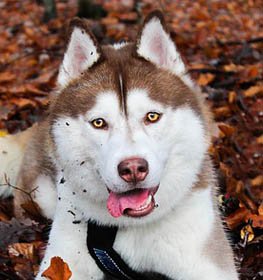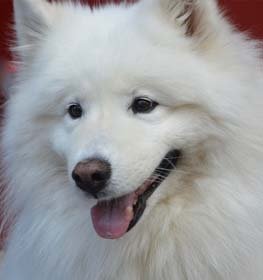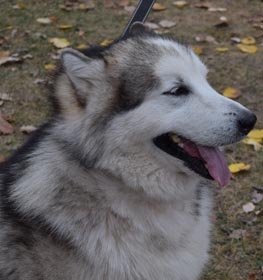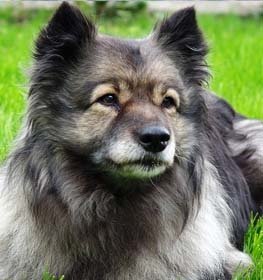Chinook Information & Dog Breed Facts
Collection of all the general dog breed info about Chinook so you can get to know the breed more.
| Group | Sled Dogs |
|---|---|
| Popularity Rank | 179 |
| Reviews | 2 |
| User Ratings | |
|
Compare the Chinook With Other Dogs
Select at least one dog breed to make the comparsion. | |
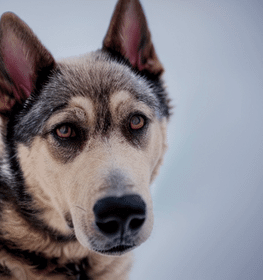 | |
| Origin | |
|
Common Names & Aliases
What other names is a Chinook known by? Discover all traditional, regional and informal names used for this breed. | Shinook |
|---|---|
|
Breed Classification
What type of dog breed is a Chinook? Learn about its genetic classification and breeding category. | Purebred |
|
Size Classification
What size category is a Chinook? Learn how big the Chinook breed typically grows. | Large |
|---|---|
|
Weight Statistics
How much does a Chinook weigh? Discover typical weight ranges for adult males and females of the Chinook breed. | Male: 70 pounds (32 kg), Female: 55 pounds (25 kg) |
|
Average Weight
What is the average weight of a Chinook? | Male: 70 pounds (32 kg), Female: 55 pounds (25 kg) |
|
Height
How tall is the Chinook? Chinook height: | Male: 23-27 inches (58-69 cm), Female: 21-25 inches (53-64 cm) |
|
Average Height
What is the average height of a Chinook? | Male: 25 inches (63.5 cm), Female: 23 inches (58.5 cm) |
|
Price Range
How much does a Chinook puppy cost? Find current market prices and factors affecting Chinook costs. | $800-$1000 If you choose to purchase the Chinook, you should know that the mentioned amount of money is an average of the collected data from breeders’ sites and puppy finder places. If you have a Chinook for sale, please advertise it on a reliable website to make sure the Chinook gets to a happy place. |
|---|---|
|
Availability
How easy is it to get a Chinook? How many Chinook are there in the world? | Frequent: The Chinook is easier than average to get. Maybe there is some risk of overbreeding, as it is a popular breed. Due to its popularity, inbreeding may occur. A new study shows that inbreeding contributes to the incidence of disease and health problems. So be careful and seek the help of an experienced person or a professional, in making your decision. |
|
Intelligence Rating
How intelligent is a Chinook? Discover the Chinook's intelligence ranking and learning capabilities. | Low to average: This canine intelligence is not the brightest one. Keep in mind that if you want to teach them any tricks, they understand and memorize new commands in 40-80 repetitions. Chinook obey the first command 30% of the time or better. So if you want to have a smart dog, you might have to reconsider your choice with this breed.
The Chinook ranks below average in the intelligence ranking of dogs. |
|---|---|
|
Training Difficulty
How easy is it to train a Chinook? Learn about the Chinook's trainability and response to training methods. | Chinook dogs are quite easy to train. Sometimes they can be challenging, but if you're consistent in teaching new commands they will obey for sure. |
|
Watchdog Rating
How good is a Chinook as a watchdog? Learn about the Chinook's alertness and guarding instincts. | Chinook dogs are good watchdogs. Their main job is to observe and they're consistent in their effort. Good vocal cords and a sense of hearing belong to them. Usually, they're territorial and protective about their property, so the Chinook dogs will alert you if they sense something different.
|
|
Territorial Protection
Is a Chinook protective of its territory? Learn about the Chinook's guarding instincts and behavior. | Chinook dogs can't provide protection for their territory. It's better to leave them out of the duty of protecting your valuables and property. |
|
Personality Traits
What personality does a Chinook have? Learn about characteristic Chinook temperament and behavior traits. | DignifiedAlertFriendlyResponsiveCalm |
|---|---|
|
Sensitivity Level
How sensitive are they? Chinook sensitivity: | Sensitive: Chinook dogs don't like an irregular daily routine, noisy household, and frequent guest visits.
This breed's emotional level reflects their owner's feelings and they don't handle punishments well. |
|
Affection Level
How affectionate are they? Is a Chinook a good family dog? | High: Chinook dogs are genuinely loyal, soft and gentle, loving, and affectionate dogs toward their handlers. They enjoy quality time with their owners despite the activity and are considered great therapy dogs for those in need. This breed responds strongly to their handler's emotions because they bond closely. Their happiness is your happiness. |
|
Social Needs
How much social interaction does the Shinook need? Chinook social needs: | Chinook dogs are a social breed. They enjoy being around people or other animals. This breed doesn't tolerate being left alone. |
|
Impulse to Wander or Roam
How likely is the Chinook to run away? Does this breed explore or wander a lot? Does Chinook roam? | Chinook dogs tend to escape less than other breeds. They have low to average wanderlust potential. Exploring the world is not the best activity they can imagine. |
|
Prey Drive
Do this canine have a strong prey drive? Does Chinook have high prey drive? | Chinook dogs have low to an average impulse to chase and catch something like a cat or any other small aminals. |
|
Barking Frequency
Does a Chinook bark a lot? Learn about typical Chinook vocalization patterns and triggers. | Average: The Chinook barks occasionally. They can change their barks depending on their emotional level and what they're trying to say. Different barks could mean the same and the same barks could have different meanings.
Top reasons for barking: protection, alarm, fear, boredom, attention-seeking, greeting, separation anxiety, compulsive barking. |
|---|---|
|
Playful Nature
How playful is a Chinook? Understand the typical play drive and energy level of the Chinook breed. | The Chinook is a playful breed. Excited barking and sometimes nipping will alert you to play. |
|
Apartment Adaptability
Can a Chinook live in an apartment? Learn about the Chinook's suitability for apartment living. | It is not the best choice if you want to keep them indoors, however, with careful exercise and several walks a day, they will tolerate the indoor environment, so it is possible to keep Chinook indoors. |
|
Lifestyle Adaptability
How adaptable is a Chinook to lifestyle changes? Learn about the Chinook's flexibility to new situations. | Chinook dogs adapt very well to lifestyle changes and basically all living environments. They don't mind moving from one place to another with their owner. |
|---|---|
|
Alone Time Tolerance
Can a Chinook be left alone? Learn about the Chinook's tolerance to solitude. | Chinook dogs do best when a family member is at home during the day or if their workplace is dog-friendly so they can take the dog at work. |
|
Bite Risk Assessment
What is a Chinook biting potential? Learn about the Chinook's bite risk factors. | Low 🔽 The Chinook has a low chance of biting somebody. Top reasons for dog bite: protection, pain, excitement, herding instinct, being provoked. (Data based on the available online bite statistics.) |
|---|---|
|
Mouthing Tendency
Is a Chinook mouthy? Learn about the Chinook's tendency to use mouth during play. | Chinook dogs have an average tendency to nip, chew, playbite, or herd people. It's a common habit during puppyhood, not aggressive behavior. These "bites" don't hurt, but Chinook dogs need to be taught a good attitude. |
|
Bite Strength Rating
How strong is a Chinook bite? Learn about the Chinook's bite force measured in PSI. | Between 200 and 400 PSI ⏺ Chinook bite force: Ordinary. Bite force Chinook measurements typically fall within the range of 200 to 400 PSI. The bite force of a Chinook is considered ordinary when compared to other dog breeds, but it is still quite powerful. This Chinook bite force PSI can cause bite wounds. Chinook bite PSI is not something that should be feared if the dog is well-trained and managed. To avoid any issues, it's essential to learn how to train a Chinook puppy not to bite from an early age.
The Chinook, and many others, have a fearsome presence because they have significant jaw strength, so it is important not to anger the dog and have it around strangers until it is fully trained. However, they are usually quite calm and good companions, they work well in families and are easy to care for. In conclusion, while the Chinook bite force is certainly an interesting aspect of the breed, it is important not to let it overshadow the many other reasons why these dogs are so loved and respected. With proper training and socialization, a Chinook can be a loyal and protective companion for your family. |
|
Average Lifespan
How long does a Chinook live? Learn about the typical lifespan of the Chinook breed. | 11-15 years The average lifespan of Chinook: 13 years |
|---|---|
|
Climate Tolerance
How well does a Chinook handle different weather? Learn about the Chinook's climate adaptability. | Prefers cold weather The Chinook can adapt well to harsh weather conditions, and also can be a good mountain dog. Dogs can suffer from frostbite and hypothermia in extremely cold weather, so it is important to take precautions to keep your dog safe and comfortable during the winter months. |
|
Health Concerns
What health issues are common in a Chinook? Discover typical conditions affecting the Chinook breed. | The Chinook is a healthy breed, but there are certain health issues that you should check with your vet regularly. |
|
Vet Care Frequency
How often does a Chinook need vet visits? Learn about the Chinook's veterinary care requirements. | Average The Chinook should have a complete physical check-up at least once per year. If your dog shows any symptoms, call your veterinarian. |
|
Health Problems
What genetic/health problems does the Chinook breed have? What are the health issues and concerns of the Chinook breed? Most common health risks of Chinook: | Cataracts Hip Dysplasia BloatSkin IrritationSeizures |
|
Energy Rating
How energetic is a Chinook? Understand daily activity needs of the Chinook breed. | Chinook dogs have an average energy level, so if you live a semi-active life, this breed can be a good choice for you. |
|---|---|
|
Activity Requirement / Exercise Need
How much exercise does a Chinook need? How much exercise do Chinook dogs require per day?
Do Chinook dogs need a lot of exercises? | Chinook dogs need a lot of exercises. Long walks should be on a daily schedule. If you live an active life, this breed can be a good choice for you. |
|
Sleeping Need
How much sleep does the Chinook breed need? | Chinook dogs sleep 12-14 hours a day as an average dog and they're not considered a lazy breed. |
|
Obesity Tendency
Is a Chinook prone to weight gain? Learn about the Chinook's obesity risks. | Average: The Chinook has an average risk for obesity. Daily walks should be on schedule. To make your dog happy and fit, feed him with quality dry dog food and live an active life together. Try to find the happy medium between exercise and feeding.
If you notice any weight gain, consult your veterinarian and make a diet plan. Reduce unhealthy food and snacks, and measure the Chinook weight regularly. |
|---|---|
|
Food Consumption
How much food does a Chinook need daily? Learn about the Chinook's feeding requirements. | 3 to 5 cups of high-quality dry food a day. |
|
Allergy Friendliness
Is a Chinook hypoallergenic? Learn about the Chinook's suitability for allergy sufferers. | No Chinook dogs don't do well with allergy sufferers by causing allergic reactions. Some dog breeds are even considered to higher possibility of an allergic response. Coat type isn't necessarily relevant, because most people are allergic to dander (flakes on the dog's skin) or saliva, not actually to dog hair. |
|---|---|
|
Coat Colors
What colors does a Chinook come in? Discover all possible Chinook color variations. | Gray Red SilverFawnGoldPalomino |
|
Grooming Requirements
How much grooming does a Chinook need? Learn about Chinook coat maintenance requirements. | Average: The Chinook requires average grooming effort. Cutting the dog's hair by a professional groomer isn't essential. Brushing the dog's coat is useful to reduce shedding. Ears and eyes should be cleaned regularly to avoid infections. Don't skip the seasonal flea treatment too. Dog nail trimming and dog bath can be helpful sometimes. Check the local pet store for dog grooming supplies and find the best dog shampoo to keep its coat healthy and give your dog a pleasant experience of a dog bath. If you don't have the time, skill, or money to take care of your Chinook, search for a dog groomer or clipping service in your area and book an appointment. Maybe you're lucky to have a dog boarding service that includes grooming or walk-in dog bath places nearby. |
|
Drooling Tendency
Does a Chinook drool a lot? Learn about the Chinook's drooling habits. | The Chinook is a perfect example of a very low drooling tendency. If you're disgusted by slobber spots on your clothes, the Chinook could be a perfect choice for you. Drooling is the unintentional saliva flowing outside of the mouth. It can be completely normal or a sign of a health problem. Certain dog breeds drool minimum compared to others, just like the Chinook.
If you notice any change in your dog's drooling habit, you should contact a vet as soon as possible. |
|
Stinkiness Rating
Does a Chinook smell bad? Learn about the Chinook's natural odor levels. | Medium ⏺ The Chinook has an average chance of bad smell. Top reasons for dog stinkiness: infection of bad tooth/ear/skin folds, gas attacks. |
|
Coat Characteristics
What type of coat does a Chinook have? Learn about the Chinook's fur characteristics. | DenseSoftThick |
|
Bathing Needs
How often does a Chinook need baths? Learn about the Chinook's bathing requirements. | 3-4 weeks More often than average. These dog coats tend to be longer, softer, and oilier than short-haired breeds. While a good bath every now and then is a great way to keep your buddy from becoming overly smelly, be mindful about overbathing.
Bathing will wash away your dog’s natural oils, while a simple brushing every few days should keep them clean. |
|
Shedding Level
How much do Chinook dogs shed? How to control, reduce and prevent the shedding of the Shinook? Do Chinook dogs shed a lot? | Chinook dogs shed moderately. It's a natural process of the hair growth cycle. Regular brushing reduces the amount of hair that sheds. It mostly depends on their health status and breed type. |
|
Child Compatibility
Is a Chinook good with children? Learn about the Chinook's behavior around kids of different ages. | Chinook dogs are very kid-friendly dogs. This breed enjoys being surrounded by children.
|
|---|---|
|
Pet Compatibility
How well does a Chinook get along with other pets? Discover the Chinook's compatibility with other animals. | Chinook dogs are generally with other pets. |
|
Stranger Friendly
Are they aggressive or friendly towards/with strangers? Chinook temperament with other people: | Chinook dogs are average friendly towards strangers. |
|
Cat Friendly
How well do Chinook dogs get along with cats? Are they good with kittens? What is this fido's temperament with cats? Can they be good with cats? Can the Chinook breed live with a cat? | Chinook dogs are average friendly towards cats. |
|
Dog Friendly
Is Chinook good with other dogs? Are they dog-friendly dogs? How well do Chinook dogs get along with other dogs? | Chinook dogs are average friendly towards other dogs. |
|
Good For First Time Owners
Is Chinook breed good for first-time owners? Do they make a good dog for novice owners? Is Chinook breed suitable for first-time owners? | Yes Chinook dogs are good for novice owners, due to their easy-going personality. |
|
Office Friendly
Are Chinook dogs good office canines? Do Chinook dogs make good office-friendly pets? Can they be office dogs? | No Chinook is not the best dog breed for office environment. |
|
Senior Citizens Friendly
Are they senior citizens friendly dogs? How well do Chinook dogs get along with the elderly people? What is the Shinook temperament with senior people? Are Chinook dogs good for elderly owners? | Chinooks are one of the best breeds for elderly people. |
|
Service Dog Capability
Can a Chinook be a service dog? Learn about the Chinook's service work potential. | Not really This breed generally not used as a service dog. A service dog is a term used in the USA to refer to any type of assistance dog specifically trained to help people who have disabilities, such as visual impairment, hearing impairments, mental disorders, seizures, mobility impairment, and diabetes. Service dogs are protected under the ADA (Americans with Disabilities Act).
Chinook is not the best breed for service purposes. |
|---|---|
|
Therapy Work Suitability
Is a Chinook good as a therapy dog? Learn about the Chinook's therapy work aptitude. | Not really This breed is generally not used as a therapy dog. A therapy dog is a dog that might be trained to provide affection, comfort, and love to people in hospitals, retirement homes, nursing homes, schools, hospices, disaster areas, and people with anxiety disorders or autism.
Chinook is not the best breed for therapeutic purposes. |
|
Scent Detection Ability
Is a Chinook good at detection work? Learn about the Chinook's scenting abilities. | Not really They are not typically employed for this type of work, but there may be exceptional cases. A detection dog or sniffer dog is a dog that is trained to use its senses (mostly its smell) to detect substances such as explosives, illegal drugs, wildlife scat, currency, blood, and contraband electronics such as illicit mobile phones.
Chinook is not the best breed for detection purposes. |
|
Search & Rescue Potential
Can a Chinook do search and rescue? Learn about the Chinook's SAR capabilities. | Not really This dog breed is not typically used as a search and rescue dog. The use of dogs in search and rescue (SAR) is a valuable component in wilderness tracking, natural disasters, mass casualty events, and locating missing people.
The Chinook is not the best breed for SAR purposes. |
|
Maritime Work Ability
Is a Chinook good on boats? Learn about the Chinook's maritime capabilities. | Not really Chinook breed usually doesn't like being on a boat. Boat dogs were typically bred for their strength, stamina, and water resistance, as they were often required to perform tasks such as pulling in fishing nets, and jumping into the water to retrieve ropes or lines, or helping to move cargo. Sailor dog is a type of dog that was bred to accompany sailors on their voyages. They were typically used for three purposes: as a working dog, a watchdog, and as a companion. A boat dog is a term used to describe a type of dog that was traditionally bred and used as a working dog on boats. |
|
Draft Work Capability
Can a Chinook pull carts? Learn about the Chinook's drafting abilities. | Not really A drafting dog or draft dog is a dog bred and used for cart pulling. Dogs bred for this work have strong builds and qualities that are needed, strength and determination.
Chinook is not the best breed for drafting purposes. |
|
Military Service Background
Was a Chinook used in military service? Learn about the Chinook's military history. | Not really In history, this breed was not really used for combat dog. |
|
Puppy Litter Size
How many puppies does a Chinook usually have? Learn about typical litter sizes. | 3-6 puppies |
|---|---|
|
Pregnancy Duration
How long is a Chinook pregnant? Learn about the Chinook's gestation period. | 60-64 days Reproductive cycle of the female Chinook: The first period called Proestrus lasts for about 9 days.
During this time the females start to attract males. You can notice by swelling vulva and bloody discharge. The second part is the Estrus when the female is receptive for the male. It lasts for about 3 to 11 days. The sign of the proestrus part is the soft and enlarged vulva. The discharge decreases and lightens in color. The third part is the Diestrus. Normally, it occurs around day 14. In this period the female’s discharge changes for vivid red and coming to its end. The vulva returns to average, and she will no longer permit mating. The fourth part called the Anestrus. The time frame between heat periods normally lasts about six months. |
|
Breeding Frequency
How often can a Chinook have puppies? Learn about safe breeding intervals. | Once a year. More frequent breeding is not healthy. It is very important not to buy a dog from a puppy mill, where the needs of the pups and their mothers are ignored. It's an inhumane high-volume dog breeding facility, where puppies born several times a year. |
|
AKC Classification
What AKC group is a Chinook in? Learn about the Chinook's AKC classification. | Recognized by the American Kennel Club in 2013 as a Working breed. |
|---|---|
|
FCI Classification
What FCI group is a Chinook in? Learn about the Chinook's international classification. | Not recognized by FCI. |
|
Kennel Club Recognition
Which kennel clubs recognize a Chinook? Learn about the Chinook's official recognition. | American Canine RegistryAmerican Kennel ClubAmerica's Pet RegistryCanadian Kennel ClubDog Registry of America Inc.North American Purebred Registry, Inc.American Canine Association, Inc.United Kennel ClubAmerican Rare Breed Association |
Chinook Pros and Cons
- Drooling Tendency: The Chinook is a perfect example of a very low drooling tendency.
- Watchdog Rating: Chinook dogs are good watchdogs.
- Impulse to Wander or Roam: Chinook dogs tend to escape less than other breeds.
- Lifestyle Adaptability: Chinook dogs adapt very well to lifestyle changes and basically all living environments.
- Child Compatibility: Chinook dogs are very kid-friendly dogs.
- Senior Citizens Friendly: Chinooks are one of the best breeds for elderly people.
- Good For First Time Owners: Chinook dogs are good for novice owners, due to their easy-going personality.
- Intelligence Rating: Low to average: This canine intelligence is not the brightest one.
- Allergy Friendliness: Chinook dogs don't do well with allergy sufferers by causing allergic reactions.
- Alone Time Tolerance: Chinook dogs do best when a family member is at home during the day or if their workplace is dog-friendly so they can take the dog at work.
- Office Friendly: Chinook is not the best dog breed for office environment.
Chinook History
The Chinook’s origin story is can be traced back with absolute certainty. An experienced Arctic explorer, named Arthur Walden, cross-bred a Siberian Husky female specimen with a large Mastiff-type dog in 1917, in Wonalancelot, North Hampshire.
This mating produced multiple healthy puppies, one of which, a larger male, showed the characteristics and traits of power, and great stamina, that Walden initially hoped to achieve. Walden then named this male specimen ‘Chinook’, and he is the one who became the forefather of the entire breed that we know today. Later, Chinook was mixed with several other breeds, including the Canadian Eskimo Dog, the Belgian Shepherd, and the German Shepherd. Female specimens were added to the mix for refining and developing the sled-dog capabilities, and male specimens were added in order to further develop strength, courage, and stamina. These characteristics were required and demanded by the explorers of that time. Walden’s breeding program quickly got renowned and popular; thus, he was invited to join Admiral Byrd’s Antarctic expedition of 1928. The original Chinook was part of the team during this expedition. Admiral Byrd’s travels were overall considered as a success, however, a terrible tragedy has happened; Chinook, who was 12 years old by that time, has wandered off into the wilderness, and was never found. Interestingly, the Chinook trail was named in honor of Chinook, which led to the dog’s original hometown in New Hampshire.
After Walden died, the Chinook breeding program’s control was passed on through a series of successions, through individual breeders. The most reputable breeders were Eva and Milton Seeley and Julia Lombard. Then, Honey and Perry Greene took over the breeding program, and eventually, they became the only people who bred the breed. However, over time, without a constant breeding program, the Chinook’s population numbers started to decrease. Consequently, their numbers dwindled too much, they became the world’s rarest breed, according to the Guinness Book of World Records. Before the 1980s, it is believed that only 28 specimens remained from the Chinook breed, and only 11 of them were sexually intact and of breeding age, worldwide. Nevertheless, fortunately, in 1981, multiple breeders and breed enthusiasts started a program to revive and save the breed from the brink of extinction. Thankfully, the efforts they made were successful, yet the Chinook is still considered to be a rare breed. Today, there are only 800 registered specimens, with approximately 100 puppies being born each year. This means a great uncertainty about the breed’s future prospects.
Regarding their recognition, both the AKC (American Kennel Club) and the UKC (United Kennel Club) registered the Chinook. Later, the Chinook was also named the Official State Dog of New Hampshire. Chinooks today are mostly kept as athletic, powerful, and active family companions. The breed is thought to be excellent around people, for the reason that it enjoys being a part of a pack or a family.
Latest Chinook Compares
Chinook Names
How old is my Chinook in human years?
You May Also Like
Rate The Chinook Breed
Chinook Comments, Reviews and Questions
- Rain Mountain Chinooks
Jul 12, 2020, 10:21:49 PM:
I've bred Chinooks for over 30 years. This website has no idea what Chinooks are actually like. For example, they are NOT good watchdogs. Go to chinook.org or rainmountain.net for the real info on the breed.
- hudson
Mar 19, 2020, 10:53:22 PM:
Excellent with children and people that owner approves. Great watch dog . gets along with other dogs and cats. will defend itself but usually won't start fights

